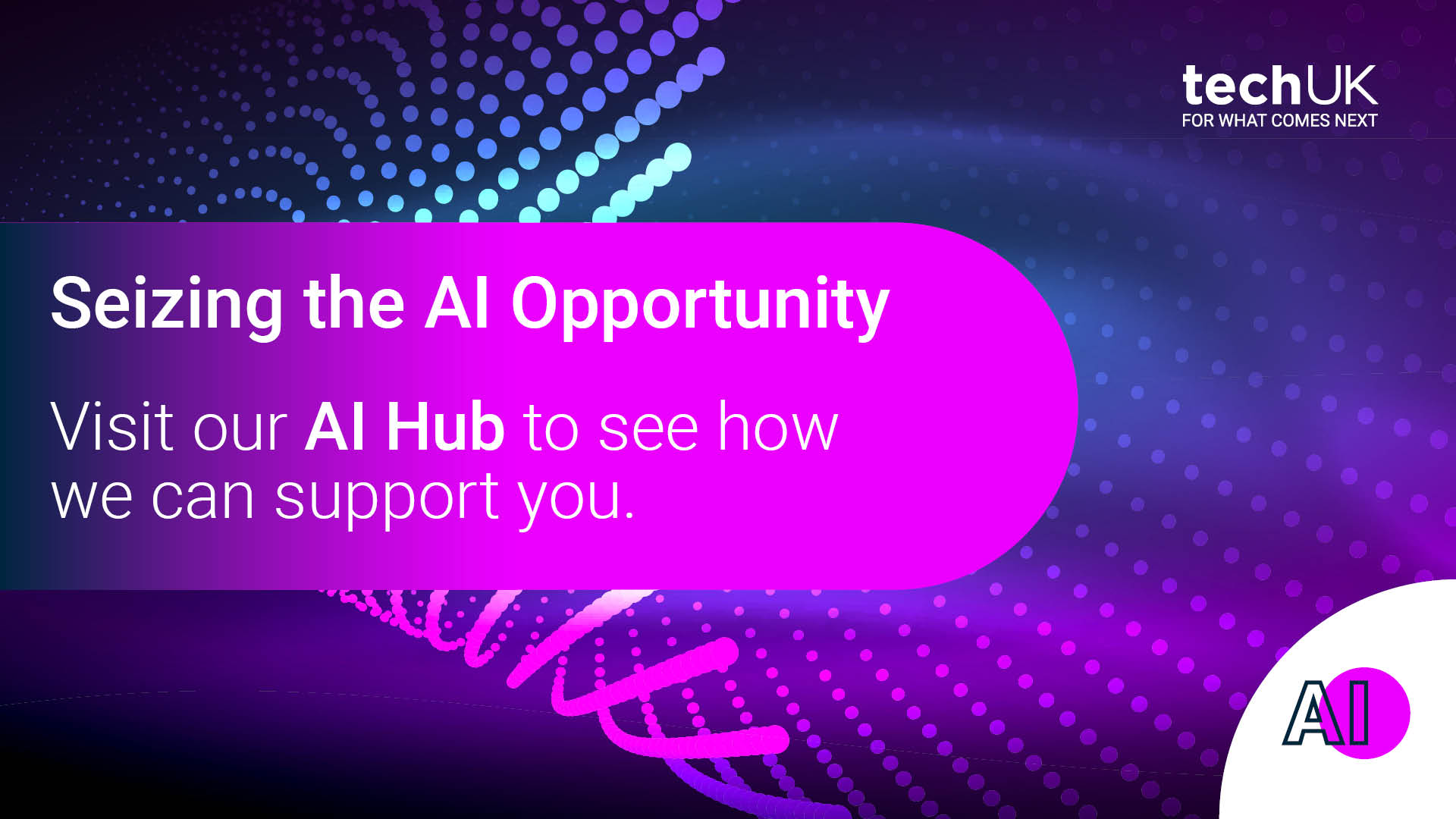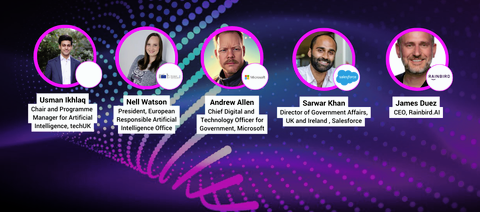Event round-up: AI Leader's Series: Agentic AI - Exploring the Next Frontier in Artificial Intelligence
This event marked the launch of techUK’s new AI Leader's Series, designed to explore cutting-edge AI topics with industry leaders. The first in our series of events focused on agentic AI, a new class of autonomous systems that operate with minimal human intervention, adapt in real time, and pursue specific goals.
In this insightful session, a panel of AI leaders explored the transformative potential of agentic AI—cutting-edge systems designed to operate autonomously with minimal human intervention. The discussion covered how these technologies are reshaping both public and private sectors, from enhancing service delivery to driving productivity.
Key topics included:
- The opportunities agentic AI presents across industries
- Challenges, risks, and strategies for responsible adoption
- Best practices for leveraging its capabilities in different sectors
Additionally, the panel examined the role of agentic AI in driving forward some of the recomendations set out in the UK Government's AI Opportunities Action Plan.
Recording:
Summary:
Speakers:
-
Andrew Allen (Chief Digital and Technology Officer for Government, Microsoft)
-
Sarwar Khan (Director of Government Affairs, Salesforce)
-
Nell Watson (President, European Responsible AI Office)
-
James Duez (CEO, Rainbird Technologies)
-
Usman Ikhlaq (Programme Manager - Artificial Intelligence, techUK)
Key themes and highlights:
1. What is agentic AI?
-
Agentic AI refers to systems that are goal-oriented, adaptive, and autonomous. Unlike traditional or generative AI, which requires human oversight or input, these systems can autonomously execute complex tasks and workflows.
-
Agentic AI allows us to delegate not just tasks, but goals. It operates at the level of intent, which creates new possibilities, and responsibilities, for AI deployment in various sectors.
2. Productivity gains:
Agentic AI’s autonomy and self-learning capabilities are particularly valuable when it comes to automating routine tasks:
-
Automating complex workflows: Unlike narrow AI that simply executes predefined tasks, agentic AI systems can take over entire workflows by not only completing simple tasks but also by managing multi-step processes that would usually require a human decision at various points. For instance, an agentic AI in a customer support role could not only answer queries but also make decisions about escalating issues, managing follow-ups, and tailoring responses based on customer context.
-
Adaptation and efficiency: As agentic AI continuously learns from its environment and interactions, it becomes more efficient over time, reducing the need for manual oversight and refinement. This increases productivity, as systems can improve with minimal human input, handling more complex tasks as they evolve.
3. Personalisation at scale:
Agentic AI systems can truly scale personalisation by actively learning from users' interactions and making decisions on how to adjust their behavior:
-
Proactive personalisation: Traditional recommendation systems often operate on preset algorithms, whereas agentic AI can autonomously adjust its actions to further tailor recommendations. For example, an AI-driven retail assistant can not only suggest products based on browsing history but can also proactively adjust its suggestions as it understands a user’s long-term preferences, emotional states, or even current needs.
-
Endless adaptability: Agentic AI learns and adapts continuously. As a result, it can refine its understanding of user preferences over time, enabling hyper-personalised experiences. This could be in the form of individualised learning plans in education, unique workout regimens in fitness apps, or custom news delivery that evolves as users’ interests change. The key distinction is that agentic AI doesn’t need human input to continuously improve personalisation at scale, it can do it automatically.
4. Faster and smarter decision-making
Agentic AI’s autonomy in decision-making is what makes it particularly powerful for delivering faster and smarter decisions:
-
Autonomous decision making: Agentic AI doesn’t simply assist humans in making decisions; it can make decisions independently. In business contexts, this means an agentic AI could autonomously decide to adjust a marketing campaign’s budget or target demographic based on real-time data and its own analysis of customer behavior, without requiring manual intervention.
-
Context-aware and real-time action: Agentic AI can process vast amounts of real-time data from multiple sources and make immediate decisions. It can interpret new information from various channels, be it sales figures, customer feedback, or social media sentiment, and make decisions, such as adjusting pricing strategies or tweaking product availability, all in the moment. It can also handle multiple, simultaneous tasks with a level of speed and accuracy that surpasses human capacity.
-
Risk reduction and optimisation: Because agentic AI systems can analyse data and learn from outcomes, they continually improve their decision-making processes. This leads to smarter decisions over time. For instance, in healthcare, an agentic AI could autonomously analyse patient data to adjust treatment plans, reduce errors, and optimise medical resources, improving overall outcomes without human intervention.
5. Risks and the role of ethics
- Agentic AI raises significant concerns regarding accountability, transparency, and safety. As these systems make autonomous decisions, determining responsibility for errors or harmful outcomes becomes complex. Transparency is another key issue, as users and stakeholders may not fully understand how AI reaches its decisions, potentially eroding trust. Ensuring that AI decision-making processes are interpretable and understandable is crucial, especially in high-stakes applications. Safety is also a concern, as agentic AI’s ability to act independently increases the risk of unintended consequences, particularly in critical infrastructure sectors. Therefore, safeguards must be integrated to ensure AI systems behave predictably and within ethical boundaries.
6. Implementation insights:
- The implementation of agentic AI should begin with pilot projects to assess its impact and measure clear returns on investment. These smaller-scale projects allow businesses to evaluate the system’s effectiveness before full deployment. Additionally, creating cross-functional teams that involve legal, technology, and operations experts ensures a comprehensive approach to AI deployment, addressing potential risks and aligning the system with organisational goals. Prioritising explainability and incorporating a human-in-the-loop design are essential to maintaining transparency and allowing for human oversight, ensuring that decision-making processes are understandable and can be traced when needed.
7. Real-world use cases:
-
The panel shared practical examples, such as intelligent automation in customer service, compliance agents, and dynamic decision support systems for local public services. These examples highlighted the tangible ways in which agentic AI could be adopted to improve operations.
techUK - Seizing the AI Opportunity
The UK is a global leader in AI innovation, development and adoption.
AI has the potential to boost UK GDP by £550 billion by 2035, making adoption an urgent economic priority. techUK and our members are committed to working with the Government to turn the AI Opportunities Action Plan into reality. Together we can ensure the UK seizes the opportunities presented by AI technology and continues to be a world leader in AI development.
Get involved: techUK runs a busy calendar of activities including events, reports, and insights to demonstrate some of the most significant AI opportunities for the UK. Our AI Hub is where you will find details of all upcoming activity. We also send a monthly AI newsletter which you can subscribe to here.
Upcoming AI Events
Latest news and insights
Subscribe to our AI newsletter
AI and Data Analytics updates
Sign-up to our monthly newsletter to get the latest updates and opportunities from our AI and Data Analytics Programme straight to your inbox.
Contact the team
Visit our AI Hub - the home of all our AI content:

Enquire about membership:












